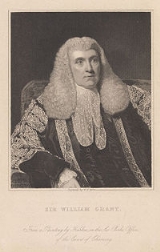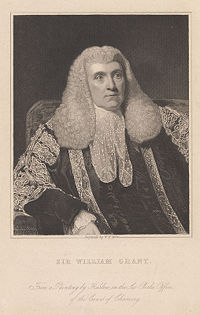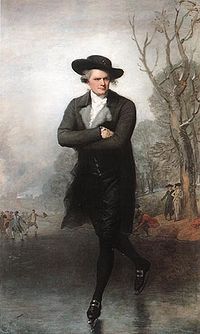
William Grant
Encyclopedia

Kingdom of Great Britain
The former Kingdom of Great Britain, sometimes described as the 'United Kingdom of Great Britain', That the Two Kingdoms of Scotland and England, shall upon the 1st May next ensuing the date hereof, and forever after, be United into One Kingdom by the Name of GREAT BRITAIN. was a sovereign...
lawyer, Member of Parliament
Member of Parliament
A Member of Parliament is a representative of the voters to a :parliament. In many countries with bicameral parliaments, the term applies specifically to members of the lower house, as upper houses often have a different title, such as senate, and thus also have different titles for its members,...
from 1790–1812 and Master of the Rolls
Master of the Rolls
The Keeper or Master of the Rolls and Records of the Chancery of England, known as the Master of the Rolls, is the second most senior judge in England and Wales, after the Lord Chief Justice. The Master of the Rolls is the presiding officer of the Civil Division of the Court of Appeal...
from 1801–1817.
He was born at Elchies, Moray, Scotland
Scotland
Scotland is a country that is part of the United Kingdom. Occupying the northern third of the island of Great Britain, it shares a border with England to the south and is bounded by the North Sea to the east, the Atlantic Ocean to the north and west, and the North Channel and Irish Sea to the...
. His father was a tenant farmer, later collector of the customs in the Isle of Man
Isle of Man
The Isle of Man , otherwise known simply as Mann , is a self-governing British Crown Dependency, located in the Irish Sea between the islands of Great Britain and Ireland, within the British Isles. The head of state is Queen Elizabeth II, who holds the title of Lord of Mann. The Lord of Mann is...
; after the death of his parents, Grant was raised by his uncle Robert Grant, a London
London
London is the capital city of :England and the :United Kingdom, the largest metropolitan area in the United Kingdom, and the largest urban zone in the European Union by most measures. Located on the River Thames, London has been a major settlement for two millennia, its history going back to its...
merchant with fur-trading interests in Canada
Canada
Canada is a North American country consisting of ten provinces and three territories. Located in the northern part of the continent, it extends from the Atlantic Ocean in the east to the Pacific Ocean in the west, and northward into the Arctic Ocean...
. Grant studied at King's College
King's College, Aberdeen
King's College in Old Aberdeen, Scotland is a formerly independent university founded in 1495 and an integral part of the University of Aberdeen...
, University of Aberdeen
University of Aberdeen
The University of Aberdeen, an ancient university founded in 1495, in Aberdeen, Scotland, is a British university. It is the third oldest university in Scotland, and the fifth oldest in the United Kingdom and wider English-speaking world...
, at the University of Leiden
Leiden University
Leiden University , located in the city of Leiden, is the oldest university in the Netherlands. The university was founded in 1575 by William, Prince of Orange, leader of the Dutch Revolt in the Eighty Years' War. The royal Dutch House of Orange-Nassau and Leiden University still have a close...
and then studied law at Lincoln's Inn
Lincoln's Inn
The Honourable Society of Lincoln's Inn is one of four Inns of Court in London to which barristers of England and Wales belong and where they are called to the Bar. The other three are Middle Temple, Inner Temple and Gray's Inn. Although Lincoln's Inn is able to trace its official records beyond...
. He was called to the bar in 1774. Grant arrived at the town of Quebec
Quebec City
Quebec , also Québec, Quebec City or Québec City is the capital of the Canadian province of Quebec and is located within the Capitale-Nationale region. It is the second most populous city in Quebec after Montreal, which is about to the southwest...
in 1775 and took part in its defence against the Americans
United States
The United States of America is a federal constitutional republic comprising fifty states and a federal district...
. In 1776, he was appointed attorney general for the province. However, Lord George Germain
George Germain, 1st Viscount Sackville
George Germain, 1st Viscount Sackville PC , known as the Hon. George Sackville to 1720, as Lord George Sackville from 1720 to 1770, and as Lord George Germain from 1770 to 1782, was a British soldier and politician who was Secretary of State for America in Lord North's cabinet during the American...
, secretary of state for the American colonies, chose James Monk
James Monk
Sir James Monk was Chief Justice of Lower Canada. He was born in Boston, Massachusetts and educated in Halifax, Nova Scotia where his father had settled in 1749....
for the post. In the meantime, Grant had issued ordinances establishing civil and criminal courts in Quebec
Province of Quebec (1763-1791)
The Province of Quebec was a colony in North America created by Great Britain after the Seven Years' War. Great Britain acquired Canada by the Treaty of Paris when King Louis XV of France and his advisors chose to keep the territory of Guadeloupe for its valuable sugar crops instead of New France...
. He returned to Britain in 1778.
Grant's legal career after his return was initially quite unsuccessful, and he contemplated returning to Canada. However, on the advice of Lord Thurlow
Edward Thurlow, 1st Baron Thurlow
Edward Thurlow, 1st Baron Thurlow PC, KC was a British lawyer and Tory politician. He served as Lord Chancellor of Great Britain for fourteen years and under four Prime Ministers.- Early life:...
, he turned with better success to the equity courts. An interview with Pitt
William Pitt the Younger
William Pitt the Younger was a British politician of the late 18th and early 19th centuries. He became the youngest Prime Minister in 1783 at the age of 24 . He left office in 1801, but was Prime Minister again from 1804 until his death in 1806...
encouraged his Parliamentary ambitions, and he was returned as Member of Parliament
Member of Parliament
A Member of Parliament is a representative of the voters to a :parliament. In many countries with bicameral parliaments, the term applies specifically to members of the lower house, as upper houses often have a different title, such as senate, and thus also have different titles for its members,...
for Shaftesbury
Shaftesbury (UK Parliament constituency)
Shaftesbury was a parliamentary constituency in Dorset. It returned two Members of Parliament to the House of Commons of the Parliament of the United Kingdom from 1295 until 1832 and one member until the constituency was abolished in 1885....
in 1790. Grant proved to be a powerful orator, giving a lucid explanation of Canadian law during the debates over the Quebec Government Bill
Constitutional Act of 1791
The Constitutional Act of 1791, formally The Clergy Endowments Act, 1791 , is an Act of the Parliament of Great Britain...
.
He received a patent of precedence
Patent of precedence
A patent of precedence is a grant to an individual by letters patent of a higher social or professional position than the precedence to which his ordinary rank entitles him.-Historical user in the English legal profession:...
in 1793, was made a bencher
Bencher
A bencher or Master of the Bench is a senior member of an Inn of Court in England and Wales. Benchers hold office for life once elected. A bencher can be elected while still a barrister , in recognition of the contribution that the barrister has made to the life of the Inn or to the law...
of Lincoln's Inn, and was appointed a Welsh justice for the Carmarthen
Carmarthen
Carmarthen is a community in, and the county town of, Carmarthenshire, Wales. It is sited on the River Towy north of its mouth at Carmarthen Bay. In 2001, the population was 14,648....
great sessions. However, he was not returned for Shaftesbury at the by-election
By-election
A by-election is an election held to fill a political office that has become vacant between regularly scheduled elections....
triggered by his appointment, returning to Parliament only in February 1794 for Windsor
Windsor (UK Parliament constituency)
Windsor is a county constituency represented in the House of Commons of the Parliament of the United Kingdom. In its modern form, it elects one Member of Parliament by the first-past-the-post system of election.-Boundaries:...
after a strenuously-fought contest. In March, he was appointed Solicitor-General to Queen Charlotte
Charlotte of Mecklenburg-Strelitz
Charlotte of Mecklenburg-Strelitz was the Queen consort of the United Kingdom as the wife of King George III...
. His oratorical reputation was renewed the following year with a defense of the Seditious Meetings Act 1795
Seditious Meetings Act 1795
The Seditious Meetings Act 1795, approved by the British Parliament in November 1795, was the second of the well known "Two Acts" , the other being the Treason Act 1795. Its purpose was to restrict the size of public meetings to fifty persons...
.

Banffshire (UK Parliament constituency)
Banffshire was a constituency of the House of Commons of Great Britain from 1708 to 1800, and of the House of Commons of the Parliament of the United Kingdom from 1801 to 1983...
, which he continued to represent until 1812. He was appointed Chief Justice of Chester in 1798, and the following year was made Solicitor General
Solicitor General for England and Wales
Her Majesty's Solicitor General for England and Wales, often known as the Solicitor General, is one of the Law Officers of the Crown, and the deputy of the Attorney General, whose duty is to advise the Crown and Cabinet on the law...
and knighted. Grant left office with Pitt, but under Addington
Henry Addington, 1st Viscount Sidmouth
Henry Addington, 1st Viscount Sidmouth, PC was a British statesman, and Prime Minister of the United Kingdom from 1801 to 1804....
, was made Master of the Rolls
Master of the Rolls
The Keeper or Master of the Rolls and Records of the Chancery of England, known as the Master of the Rolls, is the second most senior judge in England and Wales, after the Lord Chief Justice. The Master of the Rolls is the presiding officer of the Civil Division of the Court of Appeal...
and sworn of the Privy Council
Privy Council of the United Kingdom
Her Majesty's Most Honourable Privy Council, usually known simply as the Privy Council, is a formal body of advisers to the Sovereign in the United Kingdom...
on 21 May 1801. He continued to support Addington and the second Pitt ministry in debate in the House of Commons
British House of Commons
The House of Commons is the lower house of the Parliament of the United Kingdom, which also comprises the Sovereign and the House of Lords . Both Commons and Lords meet in the Palace of Westminster. The Commons is a democratically elected body, consisting of 650 members , who are known as Members...
; his defense of Melville
Henry Dundas, 1st Viscount Melville
Henry Dundas, 1st Viscount Melville PC and Baron Dunira was a Scottish lawyer and politician. He was the first Secretary of State for War and the last person to be impeached in the United Kingdom....
in 1805 brought him into conflict with Grenville when he came to power.
Grant declined an offer of the Chancellorship of Ireland
Lord Chancellor of Ireland
The office of Lord Chancellor of Ireland was the highest judicial office in Ireland until the establishment of the Irish Free State in 1922. From 1721 to 1801 it was also the highest political office of the Irish Parliament.-13th century:...
in 1807 from the Duke of Portland
William Cavendish-Bentinck, 3rd Duke of Portland
William Henry Cavendish-Bentinck, 3rd Duke of Portland, KG, PC was a British Whig and Tory statesman, Chancellor of the University of Oxford and Prime Minister. He was known before 1762 by the courtesy title Marquess of Titchfield. He held a title of every degree of British nobility—Duke,...
, but supported the Portland and Perceval
Spencer Perceval
Spencer Perceval, KC was a British statesman and First Lord of the Treasury, making him de facto Prime Minister. He is the only British Prime Minister to have been assassinated...
ministries. He left office as Master of the Rolls in 1817, but continued for several years to hear appeals to the Privy Council at the cockpit
Cockpit-in-Court
The Cockpit-in-Court was an early theatre in London, located at the rear of the Palace of Whitehall, next to St...
. Among other honors, Grant served as treasurer of Lincoln's Inn in 1798, rector
Rector
The word rector has a number of different meanings; it is widely used to refer to an academic, religious or political administrator...
of the University of Aberdeen
University of Aberdeen
The University of Aberdeen, an ancient university founded in 1495, in Aberdeen, Scotland, is a British university. It is the third oldest university in Scotland, and the fifth oldest in the United Kingdom and wider English-speaking world...
from 1809, and was awarded a DCL
Doctor of Civil Law
Doctor of Civil Law is a degree offered by some universities, such as the University of Oxford, instead of the more common Doctor of Laws degrees....
by the University of Oxford
University of Oxford
The University of Oxford is a university located in Oxford, United Kingdom. It is the second-oldest surviving university in the world and the oldest in the English-speaking world. Although its exact date of foundation is unclear, there is evidence of teaching as far back as 1096...
in 1820.
Grant died at his sister's house Dawlish
Dawlish
Dawlish is a town and civil parish in Teignbridge on the south coast of Devon in England, from the county town of Exeter. It has a population of 12,819...
, Devon
Devon
Devon is a large county in southwestern England. The county is sometimes referred to as Devonshire, although the term is rarely used inside the county itself as the county has never been officially "shired", it often indicates a traditional or historical context.The county shares borders with...
, England
England
England is a country that is part of the United Kingdom. It shares land borders with Scotland to the north and Wales to the west; the Irish Sea is to the north west, the Celtic Sea to the south west, with the North Sea to the east and the English Channel to the south separating it from continental...
on 25 May 1832. He was remembered both for the excellence and persuasiveness of his Parliamentary oration, as well as for eloquence and exposition during his judicial career.

